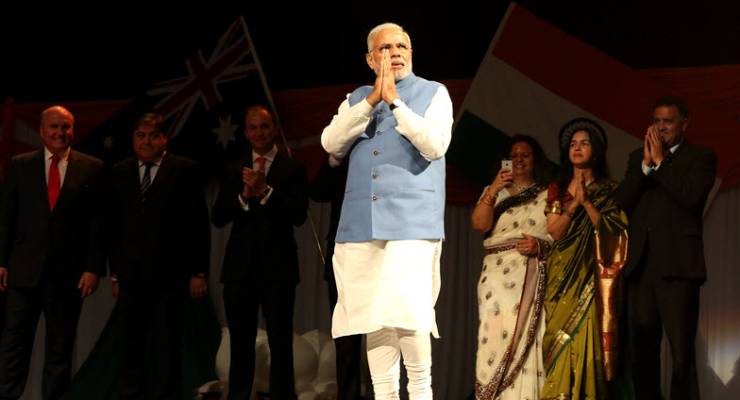
Over the past two years the intensity and frequency of violence against religious minorities has been escalating in India, a country that recently re-emerged as one Australia’s new best friends.
There has been a highly disturbing increase in lynchings, under the pro-Hindu administration of the nation’s demagogic Prime Minister Narendra Modi. Some are in the name of “(sacred) cow protection”, a uniquely Hindu issue. Violence against Christians in ethnic minority areas has increased too; recently a mob attacked a Catholic hospital compound in Madhya Pradesh including nuns. In short, fear and loathing is in abundance.
Muslims are a particular target and a series of legislative moves — some justified on equality grounds, but motivated by sectarian hate — have recently been pushed by Delhi, despite the fact that India is the world second or third most Muslim country after Indonesia.
The dark force behind Modi’s Bharatiya Janata Party that swept to power in 2014, is the “Hindutva” nationalism policy it officially adopted in 1989 and is pushed by Hindu “volunteer” organisation Rashtriya Swayamsevak Sangh (RSS). Put simply, this focuses on India as a Hindu nation to the detriment of other religions.
As usual, increased diminution of human rights countries that Australia wishes to be friendly with either militarily or strategically tends to go largely and often embarrassingly uncommented upon. This now ingrained habit of governments in Canberra of either stripe brings to mind the truism that bad things happen when good men (or countries) do nothing.
While Cambodia is an exemplar right now, there is also Vietnam, Singapore, Malaysia, Laos, the Philippines, Indonesia and of course China. Now another another problematic “friend” is getting the red-carpet treatment by Canberra.
India (the world’s second most populous nation that is due to surpass China for the dubious honour of the top spot) is fast climbing up the list of Australia’s trade partners. It’s now the country’s ninth biggest two-way trade partner and fourth largest export market, according to Austrade figures.
India’s people are, unsurprisingly given its population size and proximity to Australia, only second to the Chinese in terms of an unprecedented immigrant surge to Australia shores in recent decades. It is also the second largest source of international students — Australia’s second largest exports after minerals and energy.
Now, India has a new-found enthusiasm for the so-called Quadrilateral Security Alliance known in shorthand as the “Quad” that would pitch it together with the US, Japan and Australia in the rising battle for influence in the Asia-Pacific against China.
When the Quad was first dreamed up a decade ago (by Shinzo Abe, John Howard and George W. Bush) as a grouping of democracies that could try to contain China, India was a reluctant participant behind the scenes. In the words of one senior diplomat at the time, “a non-starter”.
Now India’s own relations with China have reached a 50-year low. The Quad was revived at last year’s ASEAN meetings with Abe is back in power in Japan. Meanwhile, China periodically tests the border it has in India’s remote and mountainous Arunachal Pradesh.
So Australia is jumping into bed with a regime whose appalling treatment of minorities and minority religions is starting to resemble that of its rival, communist China.
There is some upside, in that India remains a vibrant democracy (the BJP has been bested in recent by-elections it was predicted to win), with a largely free competitive and combative press which is lacking in so many places in Southeast Asia (despite the fact that Reliance Corporation, led by Mukesh Ambani, is now the most significant player in India’s media market).
But in the end, from the point of view of Australia, we’re dwarfed in terms of population, military clout and economic muscle by bigger neighbours — so it’s realpolitik at play. The growing India relationship makes a mockery of the government’s weary PR line about wanting to be in strategic lock-step with countries that share Australia’s “values” (whatever that means). It’s actually clear evidence that, in international relations, it’s shared interests, not values, that are most important.








India has been a country non-aligned for decades, and so perhaps Trump could do a deal to change this but the price could be too high.
This is a doubtful claim.
India has been quick to race to the defense of Indians in Australia. regardless of their religious inclinations or their caste status. Any so called “racism” in Australia gets a quick response from the India Govt.
Our Govt takes one terrified look at India’s military might and strategically submits to them.
Oh dear, someone has found Kingsbury’s old Langley faxes.
Pity he couldn’t understand them. That makes two.
Indian’s were building astronomical gardens for observatories when euroids were hitting each other with clubs.
The Great Chakra is a wheel. It turns.
Just like the central symbol on Bharat’s flag.
..come back, damned Apostrophe!